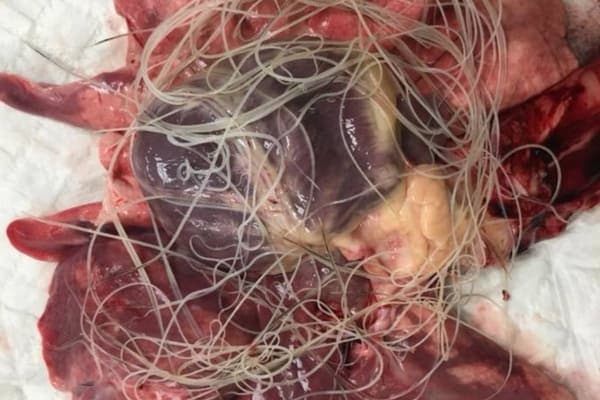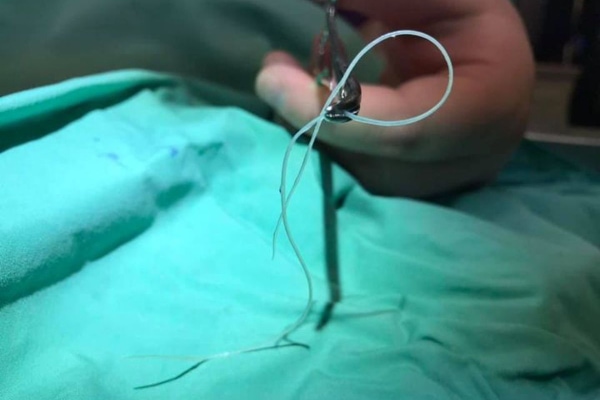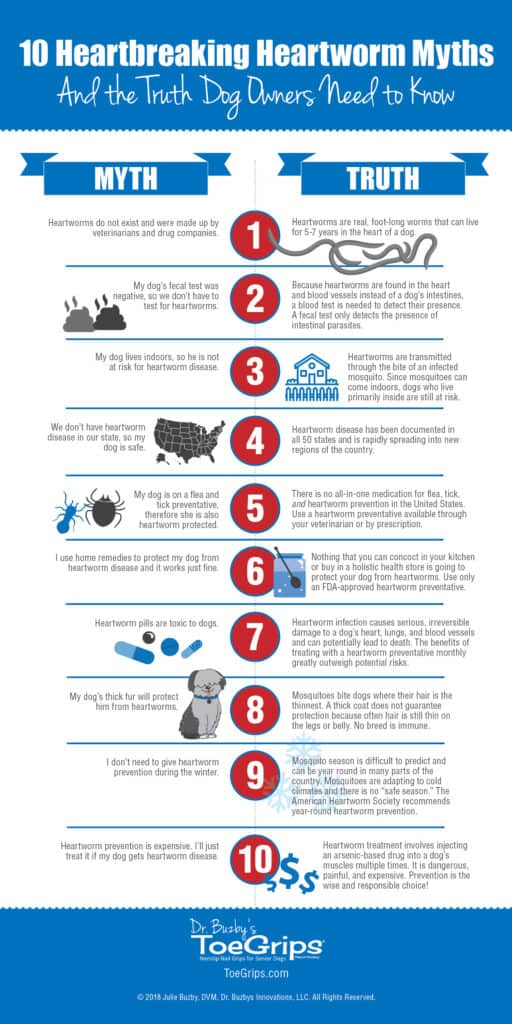Heartworm disease in dogs is a life-threatening, preventable condition. Unfortunately, a lot of myths and misunderstandings are widespread—particularly on social media—regarding heartworm prevention. From home remedies to coconut oil for heartworms, integrative veterinarian Dr. Julie Buzby helps separate the myths from facts when it comes to preventing and treating heartworm disease in dogs. Fair warning: The heartworm pictures in dogs that follow are graphic.

Practicing in the south, I’ve seen PLENTY of heartworm disease in dogs. Mosquito bites spread heartworms, so we definitely don’t get a break from it. The tragedy is that preventing this condition can be so simple.
Currently, the biggest obstacle facing heartworm disease is misinformation. Widespread myths—fallacies like dogs can’t get heartworms in cold weather or home remedies can treat heartworms—aren’t just dangerous but can be deadly for dogs.
Let’s break down some of the most common myths I’ve encountered regarding heartworm disease in dogs. As your dog’s biggest advocate, I want you to feel empowered to make the best choice for the health of your pets.
1. MYTH: Heartworms in dogs do not exist. Veterinarians and drug companies made them up.
FACT: Heartworms are real worms that can grow up to a foot long, and can live for five to seven years in the heart of a dog.
Unfortunately, even if you don’t believe heartworms exist, they are real. See the pictures of heartworms in a dog’s heart and lungs below as proof.




A heartworm picture is worth a 1000 words. These heartworm pictures from a necropsy (animal autopsy) of a dog’s heart and lungs post-mortem aren’t easy to look at, but they clearly show that heartworms exist. You can see the mass of heartworms in and around the dog’s heart.
These are foot-long worms that live in the heart, the lungs, and the associated blood vessels. Left untreated, heartworms can live from five to seven years in dogs and cause significant damage to the heart and lungs during that time. Sadly, in some cases, heartworm disease can lead to congestive heart failure in dogs or even death.
Plus, the worms reproduce inside the host dog to create microfilaria (i.e. baby heartworms). When a mosquito bites an infected dog, it can pick up those microfilaria and spread heartworm disease to another dog. Therefore, having heartworms not only puts your dog’s health at risk, but also the health of other dogs in the area.
Remember that your veterinarian is there to help you and your pets. Veterinarians do not and will not make up health conditions to make a profit or for whatever other nefarious reasons people may suggest. Vets want to help you take the best care of your pets so they can have the longest, healthiest lives possible!
2. MYTH: A home remedy will protect a dog from heartworm disease.
FACT: There is no effective “at home” or “natural” heartworm prevention for your dog.
Essential oils. Pumpkin seeds. Lemon juice. Vinegar. Turmeric. Coconut oil. I have heard about every single concoction that people have posted on social media as a potential natural heartworm preventative. There is no home remedy that a dog owner can mix in any form that will prevent a dog from getting heartworms.
While I have a healthy respect for some home remedies when used appropriately (and certainly, it is very important that you use the right ones with veterinary guidance), they are not an appropriate prevention (or treatment) for heartworm disease.
And since I’ve mentioned essential oils, if they are in your consideration set for your dog in any way, it is crucial you do your research. Certain types of essential oils are dangerous for dogs. There are a few that are safe, but you need to use them judiciously. Please ask your vet before exposing your dog to oils at home.
Herbs, pumpkin seeds, and other “natural” remedies do not protect dogs from heartworms.
Also, various foods and herbs have been suggested to prevent or treat heartworms in dogs as well. I had one client tell me she had read that she should be feeding her dog pumpkin seeds for heartworm prevention. As far as I could ascertain, the fibrous seeds were meant to flush the worms out of the digestive tract. Not only do heartworms not live in the digestive tract, but feeding pumpkin seeds would not be an effective method for ridding a dog of intestinal parasites either.
We have so many effective options for heartworm preventions: oral, topical, injectable. I have yet to find a dog that didn’t have some viable option for effective heartworm prevention, no matter the breed or other health conditions. Please administer FDA-approved heartworm preventative monthly for your dog.
Use FDA-approved products specifically labeled for preventing heartworms
While discussing the topic of preventions, make sure the FDA-approved prevention you’re giving your dog is labeled specifically for preventing heartworms. Some products protect against other parasites, such as intestinal worms, fleas, and ticks. But not all flea and tick medicine prevents heartworms. If you’re not sure, check with your vet to make sure your dog is receiving the prevention he or she needs.
3. MYTH: There are home remedies that can get rid of heartworms in dogs.
FACT: It is not possible to treat heartworms in dogs at home. Once a dog becomes infected, he or she needs a course of injectable medication to get rid of the heartworms.
Once the vet diagnoses a dog with heartworms, we are too late for the preventing stage. The worms have taken residence in the dog’s heart, lungs, and thoracic vessels, and we need to take action to clear the infection as quickly as possible to mitigate damage to the heart.
As much as I might wish there to be a quick and easy home remedy to get rid of heartworms in dogs, that is not the case. Heartworm treatment involves a series of intramuscular injections, deep in the muscles of the dog’s back, of a compound called melarsomine.
Proposed home remedies such as garlic, herbs, black walnut, etc. have not shown any impact on heartworms in dogs. In fact, garlic (which is what I’ve most commonly heard as a proposed home remedy) can be toxic to dogs. So again, please use caution with home treatments for your dog, and discuss them with your veterinarian first.
4. MYTH: Coconut oil can cure heartworms.
FACT: Coconut oil does not cure heartworms in dogs.
As discussed, the only effective treatment for heartworm disease in dogs is a series of injections of melarsomine.
For some reason, a few years ago, coconut oil emerged as a fabled silver bullet in pet care. My clients were using coconut oil to try to treat everything from heartworm disease to allergies to skin infections (i.e. pyoderma in dogs). You can use coconut oil as a moisturizer (I’ve sometimes recommended it for older dogs with dry noses), but its usefulness is more limited than the internet would have you believe. I can say with confidence that coconut oil cannot cure heartworms in dogs.
Again, as with all potential home treatments, consult your vet.

5. MYTH: Indoor dogs don’t need a heartworm preventative.
FACT: All dogs in areas affected by heartworms should be on heartworm prevention.
This is a discussion I’ve had with pet parents many times. Do indoor dogs need heartworm prevention? The answer is a resounding YES.
Unfortunately, mosquitoes know no man-made boundaries. Whether it is a house or a fenced in yard, mosquitoes can fly. They’re also blown by the winds, so certainly, they can travel the country. They can get indoors and bite unprotected dogs inside the house.
Even an indoor dog who rarely goes outside for more than a walk or potty break is still at risk for heartworms. It only takes one bite from one mosquito to infect a dog with heartworms. There are up to 30 different species of mosquitoes that transmit heartworms and they can all slip into a house quite easily. I have diagnosed heartworms in paper trained dogs who don’t even go outside to relieve themselves. Yes, mosquitoes bite inside our homes.
Please keep your dog on heartworm prevention, even if he or she stays primarily indoors.
Along similar lines, spraying for mosquitoes is not enough to prevent heartworm disease. And yes, dogs who live in gated communities should still be on heartworm prevention.
6. MYTH: Dogs don’t need heartworm preventative during the winter months because it’s cold outside.
FACT: Dogs can be infected with heartworms year-round.
Cold temperatures do not safeguard dogs from heartworm disease and the insects that carry it. I’ve seen many sad cases of dogs who have tested positive for heartworms. The dogs’ owners stopped giving preventative during the cooler half of the year—the winter months.
So can dogs get heartworm in the winter? Unfortunately, yes. Some species of mosquitoes are adapting to colder climates. Plus, heartworm disease exists year-round in the host animal—such as a coyote, fox, wolf, or an infected dog. Thus, it is really important to give year round prevention.
Is the risk of contracting heartworm disease decreased in colder temperatures? Maybe. But I am not willing to gamble my pets’ or my patients’ health on an unknown. The risk is not zero, and heartworm disease is so much easier, cheaper, and less invasive to PREVENT than it is to TREAT.
I recommend to all my clients to keep their dogs on heartworm prevention year-round.
7. MYTH: A dog’s thick fur will protect him or her from mosquito bites and thus heartworms.
FACT: Heartworms are spread through mosquito bites. Dogs with thick fur are still at risk of being bitten by mosquitoes, and therefore potentially becoming infected with heartworms.
“My dog has a really thick coat. There’s no way the mosquito can bite through it.” This is a common misconception that a dog’s thick fur protects him or her from getting heartworm disease. I’ve heard this from my veterinary clients with Chows, Huskies, and other long, thick-coated dogs.
The truth is that mosquitoes bite pets where the hair is thinnest. Often the hair, even in a thick-coated dog, is still thin on the legs or the belly. And that’s where the mosquito is going to bite. I have personally treated heartworm positive Pomeranians, Huskies, and other breeds that are known for their thick undercoats. It’s not a protection. Mosquitoes will find the dog’s soft inner groin, belly, and skin where the coat is thinnest.
8. MYTH: We don’t have heartworm disease in our state.
FACT: All 50 states (and worldwide) have documented cases of heartworm disease in dogs. Not only has it been recorded, but it is also on the rise.

Here is a true story that helps illustrate why this is the case: A client came to me with a dog that needed to be treated for heartworm disease. While talking to them I discovered the dog and pet parent had moved into the area from a different state about three years prior.
I was sad for the dog, of course. But I was also sad because that dog, during those three years, had served as a “reservoir of infection” for the area. That means that if a mosquito bit the infected animal, then that mosquito would then become infected and potentially infect other dogs. It is a domino effect.
Secondly, the convenience and ease of travel in today’s world fans the spread of heartworm disease. After hurricane Katrina, for example, over a quarter of a million pets—many of whom were heartworm positive—were shipped around the United States in this great concerted rescue effort. As encouraging and uplifting as this was, it also guaranteed the increase of heartworm incidence around the country.
At this point, no state is heartworm-free. If you’d like to learn more, check out the American Heartworm Society’s heartworm tracking incidence map.
9. MYTH: If a dog’s fecal test is negative, heartworm testing isn’t necessary.
FACT: Testing for heartworm requires a blood sample, and is a separate test from a fecal test, which is generally used to diagnose intestinal parasites.
Many other species of worms (hookworms, roundworms, and tapeworms, for example) are internal parasites that live in the intestines, in the gastrointestinal tract. Heartworms live in the circulatory system—the lungs, the heart, and the associated blood vessels. And because heartworms are present in the heart and the circulatory system (not the intestine), it takes a blood test for dogs to detect them.
To test for heartworms, veterinarians administer a specific heartworm antigen test (not a fecal test for dogs) using a few drops of blood from the dog. Often the lab test results are available in just 10 minutes.
10. MYTH: Heartworm pills are toxic to dogs.
FACT: Heartworm preventatives have been extensively studied for both efficacy and safety, and have wide safety margins.
I understand the concern about what we are putting into our bodies and our dogs’ bodies. But I always tell my clients that with everything in life we have to weigh the benefits versus the risks.
There are many safe FDA-approved heartworm preventatives on the market. My own personal dogs get a monthly heartworm preventative, because I’d never open them up for the risk of contracting heartworm disease. The potential risk posed to them by the preventative medications is far less than the risk of either heartworm disease or treatment.

BONUS MYTH: Herding breeds should not take heartworm prevention
FACT: When given at the dose on the label, heartworm preventatives are safe for herding dogs with the MDR1 mutation.
Certain dog breeds—Border Collies, Australian Shepherds, Shelties, and others—may have a mutation in a gene called MDR1 that impacts their ability to metabolize certain drugs. One of the drugs well documented to give these dogs trouble is ivermectin. Since many heartworm preventions contain ivermectin or drugs in a similar class, it is understandable that dog parents may be leery of giving heartworm prevention to dogs who could have the MDR1 mutation.
That being said, the dose of ivermectin in monthly heartworm preventions is much lower than the amount of ivermectin that would make a dog sick, even one with the MDR1 mutation. Plus, the manufacturers of Heartgard®, Interceptor®, ProHeart®, and Revolution® have tested their products for safety in dogs with the MDR1 mutation. And the FDA has determined those preventatives are safe for dogs with the MDR1 mutation. (Just because a preventative isn’t on that list, doesn’t mean it is unsafe. Please talk to your vet about what is best for your dog.)
Interestingly, the dogs I’ve seen with ivermectin toxicity usually get sick after being at the barn with their owner who was deworming horses. As you might imagine, the dose for horses is much larger than for dogs. And horse deworming paste is usually apple flavored or something else enticing to a precocious pup. So it goes like this. The horse spits some out, the dog licks it up, and it makes the dog sick.
As an integrative veterinarian with 25+ years of experience, I have not seen a dog get ivermectin toxicity from an FDA-approved heartworm preventative when given at appropriate (i.e. labeled) doses.
Let’s bust these myths about heartworm disease in dogs together
If you see people propagating these myths about heartworm disease in dogs on social media, please help set the record straight. Ultimately, dogs are the ones who suffer when we get this wrong. That’s why it’s so important to bust the myths about home remedies such as coconut oil and pumpkin seeds for heartworms in dogs. And it’s why it’s so important to correct misunderstandings such as indoor dogs don’t need heartworm preventative.
Finally, the benefits of a heartworm preventative outweigh the risks. If you are interested in more information, I encourage you to check out my companion article, Do Senior Dogs Need Heartworm Medications and my podcast episode, 10 Heartbreaking Heartworm Myths.
Also, speak with your veterinarian about heartworms or which heartworm preventative is the best choice for your dog. Together, you and your vet can keep your dog safe from this preventable disease.
What other myths about heartworm disease in dogs have you heard?
Please comment below.



I just got home from the vet , my dog,(lab), tested positive for heartworm,(he was a rescue, found abandoned) . the vet said the “control” lit up before the other part of the test….he said that the dog had “full blown” heartworms….he is approximately 3years old, and he would NOT give him a rx for heartworm medicine, because it might kill him .he said that he had never successfully cured a dog of heartworms that was over the age of five, and that we need to seriously think of our options…to treat for 1,400. or let him die whenever the time comes….. your opinion?
Hi Tina,
I am sorry your Lab has received this diagnosis. Without personally talking with your vet, it is hard for me to make assumptions about the choices that have been made. I will give you facts and try to offer information and hope you can use it to decide how to proceed with your boy. Also, it is always ok to seek a second opinion if you have lingering concerns or unanswered questions. You deserve to feel confident in the medical care your pup is receiving and need to have trust in the vet you choose to partner with. There is some evidence to show that (in rare cases) dogs that are heartworm positive can have a deadly reaction when given certain heartworm preventatives. In the past, preventatives containing ivermectin as their active ingredient were thought to be safer and often used in heartworm positive dogs with great success. The gold standard for heartworm treatment is giving Melarsomine injections to eliminate the adult heartworms (this is probably the $1400 you were quoted). If dogs are not healthy enough to receive the injections or if there are financial limitations that will not allow this type of treatment, then vets have used a “slow kill” method to achieve a heartworm negative status. This other method uses heartworm preventatives (usually one with Moxidectin as the active ingredient) to ensure a dog does not contract any new/additional heartworms while waiting for the current worms present to finish their life cycle and die naturally. Often a vet will prescribe Doxycycline to give at the same time, as it has been shown to weaken the heartworms and allow them to die off faster. Generally, it can take 6-9 months for adult worms to finish their life cycle and die. This is why it is recommended to recheck a heartworm test at 6 months post treatment and again at 12 months. Some dogs will show a negative test at the 6-month mark, but all should be negative by 12 months. I am not aware of any age limitations as it pertains to successful heartworm treatment. Here are the official recommendations for treatment and testing as outlined by the American Heartworm Society: https://www.heartwormsociety.org/veterinary-resources/american-heartworm-society-guidelines
And here is a link to an article published in the Frontiers Veterinary Science Journal that disucsses the “slow kill” method with Moxidectin and Doxycycline: https://www.frontiersin.org/articles/10.3389/fvets.2021.702018/full
Sorry for such a lengthy reply but I wanted to make sure you were well informed! Hoping this will help guide your conversations with your vet and give you the courage to keep advocating for your sweet boy’s health and well-being!
I understand the need for heart worm protection but I live Canada where the winter temperatures can be below 20 . I understood that for mosquitoes to transfer the heartworm the temperature has to be consistently above 57 degrees Fahrenheit for two weeks. I do not like to give my dog heartworm protection since he is 10 years old and has high liver enzymes and start of kidney disease but I do give him the Interceptor for heart worm only during the summer months.
Hi Tina,
Thank you for sharing your experience and perspective with us! What you describe goes with the current recommendations for Canada based on a research article published with The Canadian Veterinary Journal in 2019. As long as your vet is in agreement with this prevention protocol, I’d say keep up the good work!
My dog has been in heart worm medicine for years without missing a dose. I just realized I am two weeks late for the first time. I see mixed messages online about whether to give dose immediately or wait until the next regular dose. If I give it immediately will my dog be covered ( I see a number of places that there is a 45 day “grace” period) and should I give next dose 30 days later or back on my regular schedule on the first of the month?
Hi Ruthie,
Go ahead and give the prevention as soon as possible! You should be ok but please let your vet know about this “missed dose”. It takes about 6 months for heartworm disease to become detectable by a test. So, your vet may recommend running a heart worm test 6 months from today just to play it safe. The risk is probably very low, and I would be surprised if your dog contracted heart worms during this period. Try not to stress and keep up the good work!
when my dog was 2 he was coughing severely and the blood started he had gotten so ill he couldnt walk to potty he had be carried outside he got to real skinny all me and my husband to think of to try save him,because he wasnt eating ,we poured raw egg down his throat and gave him a tablespoon olive oil twice daily ,in about a week he improved and finally started eating and hasnt stopped ,its been 6 years now and he has coughed the whole 6 years, i havent seen blood in a long time but i noticed he lay back down few days ago instead of running outside, anyway what do you think of him living so long with heartworms and what i gave him the virgin olive oil and eggs he is about 8 now and almost died at 2 when i gave the eggs and olive oil and is he in real trouble now, i also on limited income .He is an american pitbull.
Hi Tammy,
I am sorry your dog has been dealing with chronic coughing for so many years. Without examining him myself it is hard to make specific conclusions and recommendations. It sounds like he may need to be seen by your vet. Hoping you can get some answers and offer your boy some relief.
A former rescue group supplied doxycycline and double dose ivermectin/pyrantel for dogs being adopted with heartworm disease, a long with instruction to retest in 6 months, and repeat once if necessary. Veterinarian should be apprised of slow-kill regimen at home..
Thoughts?
Hi Mary,
This approach to heartworm treatment does work. Basically, you are waiting for the heartworms that are already present to finish their life cycle and die off while using the ivermectin (active ingredient in most heartworm preventatives) to prevent reinfection. The natural heartworm life cycle is about 6-7 months. This is why you start treatment and then retest in 6 months with the understanding the infection may not be fully cleared and it could take a bit longer before a negative status is achieved. The ivermectin or heartworm prevention would need to be done monthly to prevent reinfection while waiting for the adult heartworms to die. Also, as long as heartworms are present in the body there is a slight risk of an anaphylactic reaction to the worms causing sudden death. The worms also cause heart problems, lung issues, and can put the dog at higher risk for blood clots and other negative side effects. These reasons are why veterinarians usually recommend treatment with injections instead of the “slow kill” method. But if the treatment injections cannot be performed (due to health reasons or financial issues), the “slow kill” method is an option. I hope this clears things up a bit. Best wishes!
my dog was diagnoised with heart worms,the vet wants $1870 dollars to treat them,im disabled and on a fixed income, i love my dog and dont want him to die,is there another alternative, a cheaper treatment,so agencys that might help me, im divastated and desperatly need help for my dog,do you know anyone that can help? any asssistance in this matter wouuld be greatly appericated,thank you and God Bless
Craig Bennett
267 mine rd
tunnel hill, ga 30755
[email protected]
706 537 8661
Hi Craig,
I am sorry your pup was diagnosed with heartworm disease. While it is best to have the worms killed quickly to prevent damage to the internal organs, it may be possible to clear the infection by what is sometimes referred to as the “slow kill method”. Not all veterinarians will offer this as an option so you may need to call around and get some second opinions. The idea is to prevent your dog from acquiring more heartworms while waiting for the current worms present in the heart to live out their natural lifespan and then die. This is very risky because the longer the worms are alive in the body, the higher the possibility they can cause damage to the heart and lungs or cause other serious complications. Also, when the heartworms die, the dog can experience an anaphylactic reaction that can be deadly. So, while this is not recommended, sometimes it is the only option. I hope this helps a bit. Praying your sweet boy is ok and will live a long and happy life. Best wishes to you both.
In Colorado in a town over 6,000 feet elevation, I was told by a friend with dogs that they don’t have mosquitoes at the elevation and therefore not necessary.
is it required above 6000′ elevation in Colorado?
Hi Debi,
I found this info on Colorado State University’s website. These frequently asked questions were on the topic of West Nile Virus, but I think you will find this pertains to your question as well.
“I like camping and other activities in the mountains. Do the mosquitoes that transmit West Nile virus occur at high altitudes?
Culex tarsalis, one of the main West Nile virus vectors, commonly occurs up to altitudes of 8,500 feet and is found as high as 10,000 feet above sea level. Other potential vectors are more common above 8,500 feet and can be found well above this elevation. On the other hand, the transmission season becomes shorter as elevation increases, which probably reduces risk significantly. Given the lack of knowledge and experience with this disease in Colorado, it is prudent to use an effective repellent when mosquitoes are active, even at these higher elevations.”
In case you would like to read more, here is a link to the website: https://extension.colostate.edu/topic-areas/insects/west-nile-virus-and-mosquito-management-frequently-asked-questions/#Mosquito%20Biology
I always think it is easier to prevent heartworm disease than it is to treat it. Also, I like the intestinal parasite prevention that is usually found in heartworm medications as well since some of the more common GI worms are potentially contagious to humans.
Hi
Can i give my pomeranian dog heartgard plus? He is only 2 kilograms.
Hi Max,
The smallest dosage of Heartgard Plus does not have a minimum weight limit. It is labeled to be safe for dogs up to 25 pounds of body weight. With that being said, you should consult your vet to find out if Heartgard Plus is a good option for your pup’s specific needs. Also, a negative result from a heartworm test would need to be obtained prior to starting heartworm prevention for dogs over 6 months of age.
I was reading research into heartworms and from what I understand the heartworms are developing resistance to heartgard and proheart and the only thing capable of keeping the beagles (poor little beagles) heartworm free was ProHeart 12 shots so why are they still selling them if they’re not working and the worms are developing resistance to them? Isn’t this to use a human term because I don’t know what to call it in veterinary medicine but malpractice! I mean by giving dogs medication that’s starting to not work then if you are one of the lucky ones that get the resistant worms your dog gets to die or you get to pay a ton of money and get accused of not giving your dog the medication properly even if you did! It seems like a waste to buy them considering the low rates of efficiency! But don’t those shots have some nasty side effects especially on some dogs? My dog is a 15yr old Rhodesian ridgeback and I don’t live in an area with high rates of heartworm there, were 3 cases last year reported. Of course that doesn’t mean that is every dog with heartworm because there’s no way to tell whose not treating or testing until they become extremely ill! But when I get a new puppy I would like to know what you’d do with your dog? Continue with the safer yet less effective treatment since I don’t live in the area where they have high rates of infection or play it safe with the heartworms and less safe with the treatments?
Hi Deborah,
I hope I can shed some light on this situation. Evidence shows that some heartworms in certain areas of the country are developing resistance to heartworm prevention. There may be a hereditary component to this resistance passed on genetically in dogs. At this time there is still much we don’t really know. What we do know is that the resistant heartworms are not a widespread concern and year-round heart worm prevention is still the recommendation of the American Heartworm Society. The resistant heartworms are resistant to all preventatives in the macrocyclic lactone family, this includes every heartworm prevention I am currently aware of. Odds are, if your pup comes into contact with heartworms, it will be worms that are not resistant and should be killed easily by any of the current prevention options. I will always keep my dogs on monthly prevention not only to prevent heartworm infection but also to deworm them for intestinal parasites that can be contagious to people. The saying is true, an ounce of prevention is worth a pound of cure. Also, I recommend testing for heartworms yearly. With yearly testing, should an issue with efficacy arise, you can catch the issue quickly and address it. I hope you find the answers you are looking for and can make a decision you are comfortable with moving forward. Best wishes!
So what would be the best home remedy to apply to your 10 year old dog to treat heartworms??? Please I need some assistance in this matter my dog is lethargic and the ribs swole please help
Allen,
Sorry to heart that your dog was diagnosed with heartworm disease and is not doing well. I feel strongly that there are no acceptable home remedies for heartworm disease. Please contact your veterinarian promptly to discuss your dog’s case. Untreated heartworm disease can cause long-term heart and lung damage or even death so it is critical that your dog is treated by a veterinarian using drugs that are developed and approved for that purpose.
Thank you for informative info concerning heartworm! It now has become a problem even in Colorado! I do however have a precaution & that is the shot given for a six month period. My dog was 10 when I began heartworm as it had not been an issue before! I questioned 2 different vets( my dog is not in a private vet practice) about the shot for a dog over 7 yrs old as I had read not a good idea. Both told me it was fine & there was no problem! I was not given an information sheet about the shot to sign & on 2nd visit I agreed to it! Horrible mistake! My dog suffered a stroke or seizure could not eat or drink( I was spooning water in her mouth)! When I did some research I found many dogs much younger had died from same shot & found out from FDA that shot had been taken off market in 2004 put back on in 2014 w/ no change! Shocking! My dog did survive w/ a lot of treatment & care but her face is lopsided she eats & drinks out of side of her mouth as her tongue is crooked& it aged her! I stringy recommend no dog of any age get this shot! Be a good pet owner & give the pill once a month not a big deal, I wish I had a agreed to that not the SHOT!
Hi Debra, You are absolutely right that Colorado is now a state that needs to take heartworm prevention seriously. I’m so sorry to hear your dog’s story, and I’m glad she is still with us. Thank you for sharing your experience. I have to confess that I’m also not a fan of the injection. My concern is that if there is some sort of adverse reaction, there’s no way to get the medication “out” of the body. It’s designed to be a long-acting treatment. However, I do know many colleagues who like and recommend it.